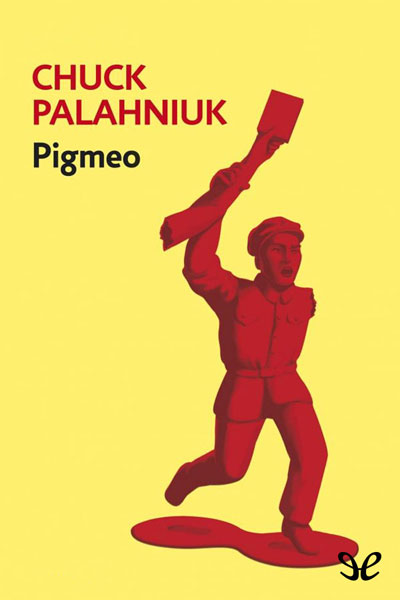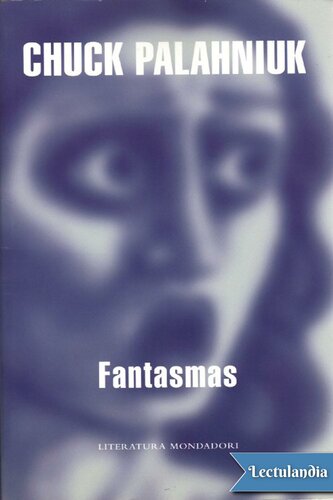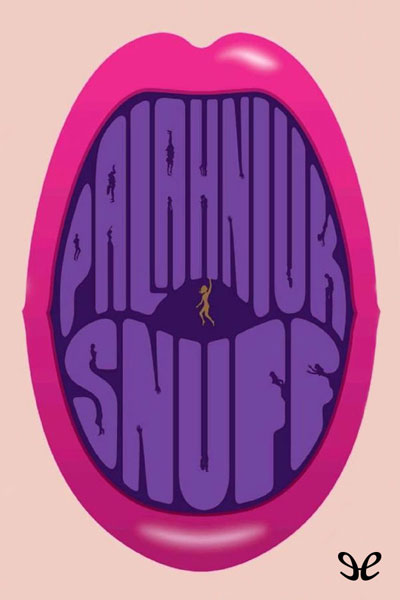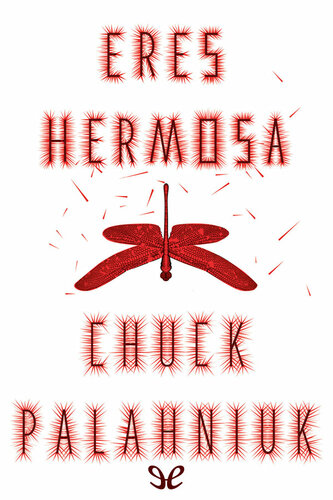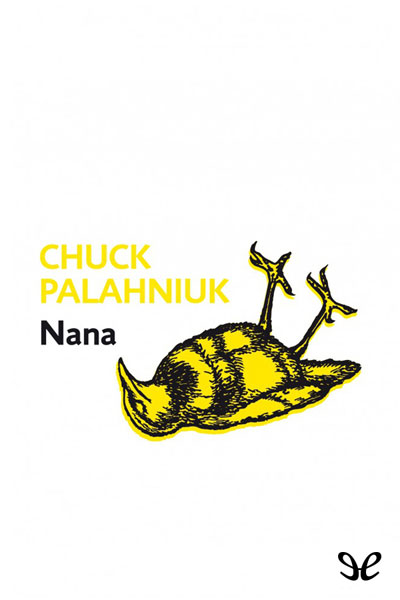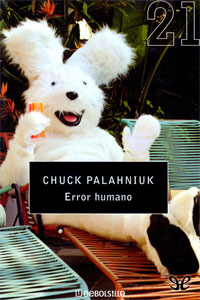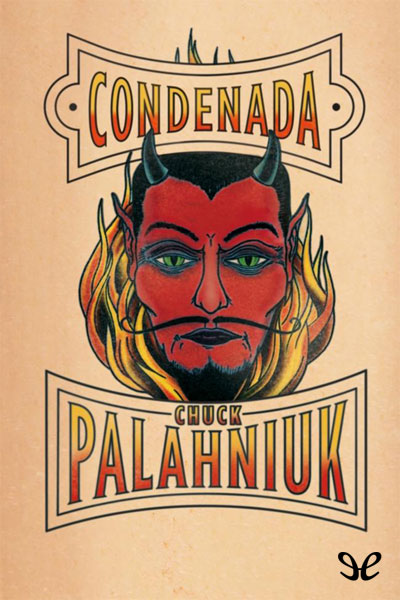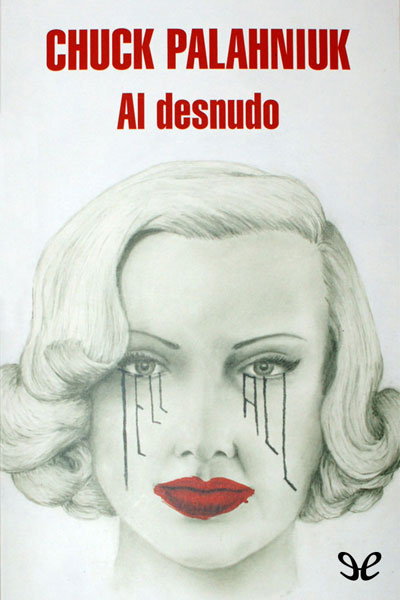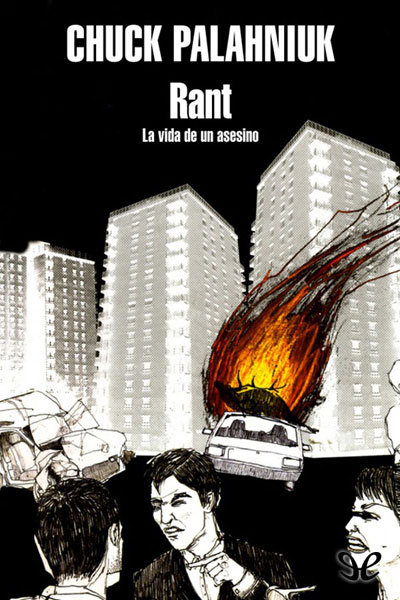oleebook.com
Club de lluita de Chuck Palahniuk
de Chuck Palahniuk - Género: Intriga
Sinopsis
Club de lluita (títol original en anglès: Fight Club) és la primera novel·la de Chuck Palahniuk, publicada el 1996. La trama gira al voltant dun protagonista sense nom que lluita contra la seva creixent molèstia cap al consumisme i els canvis de lestat de la masculinitat en la cultura nord-americana. En un intent per superar-la, crea un club de boxa clandestí com a nova forma de teràpia.
La novel·la va ser adaptada al cinema amb el mateix títol el 1999 pel director David Fincher, el qual la convertiria en un fenomen de la cultura popular. Per la seva popularitat, la novel·la sha convertit en blanc de moltes crítiques, principalment per les seves descripcions explícites de violència.
Descargar
Descargar Club de lluita ePub GratisLibros Recomendados - Relacionados
Reseñas Varias sobre este libro
the first rule of reading fight club is: you do not talk about reading fight club.
which is a good thing because i honestly have no idea what i read.
man, this book is W I L D.1,048 s ruzmarì153 70
Mary Ann Evans, in the 1850s, spoke out against the notion that "lady novelists" were capable of producing only "silly novels" - precious, sentimental, illogical and improbable claptrap - while men produced high literature. She changed her name to George Eliot and wrote as a "gender neutral" narrator, highly educated and worldly, and mostly transparent (i.e., not silly).
The 1990s finds us again at a crossroads where literature is concerned, with the rise of Oprah's book club and the whole genre of "chick lit" on the one hand (in many cases just "silly novels by lady novelists" revivified), and a sort of phallic-anxiety heavy-on-the-masculine literature on the other. This second group, I to call "guy crap." It's not a bad label ; there's some good stuff in guy crap, just there is on Oprah's book list. Guy crap includes genre fiction (Dennis Lehane, Jonathan Lethem), as well as insistent intellectualism (David Foster Wallace, Martin Amis, Paul Auster) ... and, of course, the violent, psych-you-out, latter-day-Robbe-Grillet disturbances of Bret Easton Ellis and Chuck Palahniuk. Some of these are done well, and some of them are just as silly as the lady novelists' claptrap.
Fight Club is one of those novels where the unrelenting GUY-ness of narrator and storyline begins as an intriguing challenge and ends up fatiguing and gimmicky. In case there's anyone out here who hasn't either read the book or seen the movie, I won't spoil anything, I promise. It's a book about a bunch of young men, frustrated in their low-on-the-ladder white-collar day jobs and the emptiness of modern society, who meet routinely to pound each other close to death and plot destruction on a less personal scale. The novel is Palahniuk's testament to the counter-culture of yuppiedom, a world in which squalor and presentability, upward mobility and civil disobedience, live side by side and take each other's measure daily. Palahniuk asks pointed questions about the world we live in, and his prose is the strength of this novel - he keeps you interested, even when you realize how much you hate what he's saying.
And you should hate what Palahniuk is saying. Because at the heart of the novel sits a troubled foundation. It's not the acts of (juvenile, for the most part) sociopathy, or even the ultimate real pathology the characters fall into. What you should hate as (or after) you read is the book's central three-part idea, that (a) the disaffected youth of the video-game generation really do hold the truth about society ; (b) society in turn is nothing but a reflection of the video-game generation's disaffected world-view ; and (c) once a disaffected youth of the video-game generation, always a disaffected youth of the video-game generation - there is no improvement, there is no connection, there is no healing, there is no "out," because boys never grow up. Even the support-group conceit that could represent the narrator's redemptive attempt at relation turns out to be just a device, as egotistical for the character as it is ultimately for the storyline. Relation between people doesn't exist, not really : you don't talk about fight club. We're all just wandering bruised through the wasted LCD landscape, staking out our independence rebel teenagers, promising to blow up whatever we disagree with.
Palahniuk has said he wrote this book as a kind of provocation, to get back at a publisher for turning down his earlier manuscript. I wonder if he peed in the publisher's soup, too : it wouldn't altogether surprise me.wouldnt-read-again563 s5 comments anarki79 155
You do not talk about Fight Club, but...
Upon winning the Oregon Book Award for best novel and the Pacific Northwest Booksellers Association Award, Chuck Palahniuks visionary debut novel, Fight Club, was shot to the veins of mainstream fiction. Following the success of its 1999 film adaptation directed by David Fincher, Fight Club gained cult classic status and has become a disturbingly accurate interpretation of our modern world.
The unnamed male narrator, suffering from a long streak of insomnia, finds cure by attending cancer support groups. But when Marla Singera sallow, heavy-smoking nihilistenters the evening meetings and mirrors his own fraud, his insomnia returns, so he confronts Singer to split schedules with him.
On the night when his condominium mysteriously blows up, he calls Tyler Durden, whom he had previously metunder strange circumstanceson a beach. They agree to meet at a bar, where, after drinking, Durden asks him a favor, I want you to hit me as hard as you can.
The narrator swings the punch that cradled Fight Club into the world. Shortly, a multitude of men with white-collar jobs join them. Every weekend, in the parking lots and basements of bars, they hold these late-hour no-holds-barred-and-barefisted fights that go on as long as they have to.
These one-on-one melees curiously evoke psychotherapeutic effectsresembling that of enlightenmentwithin the men: they are reborn from their entombed lives.
Fight Club soon evolves into Project Mayhem, an anarchic army led by Durden, who seeks to fulfill his visions of global enlightenment through organized chaos, public unrest, and demolition.
Fight Club is a social satire on the dehumanizing effects of consumerism: alienation brought by chronic materialism, illusory comforts, overindulgence, and career and lifestyle obsessions fueled by advertising. The modern world is for businessnot for the people, as what the great psychoanalyst Carl Jung said.
Its only after youve lost everything that youre free to do anything. Skillfully fusing Zen elements with Durdens extremist ideologies, Palahniuk has written a provocative expression of metaphysical rebellion. The collective revolt against the existential vacuum is Durdens nucleus and what draws men toward him.
Fight Clubs noir ambience and the solid economy of its prose are reminiscent of Albert Camuss The Stranger, but with the sharp nonlinear narration executing its plot; inheriting Kurt Vonneguts dark humor, Chuck Palahniuk is among todays distinct and intriguing voices.re-read real-horrorshow547 s Sean Barrs 1,122 46.6k
You are not special. You're not a beautiful and unique snowflake. You're the same decaying organic matter as everything else. We're all part of the same compost heap. We're all singing, all dancing crap of the world.
Fight Club is absolutely tragic in its reflection of the real world. I get angry when I read it and annoyed at a world that could cause such a situation. This may be fiction, but its full of truth.
The modern world is unfulfilling and depressing. People spend their lives working in call centres or sat behind desks slowly getting more miserable until they become depressed and want to kill themselves. The modern world drives people crazy with its insufferable and suffocating ways. Its a concrete jungle and not all of us can find happiness amongst the endless grey days of mundanity.
And in a way, Fight Club is a reaction against that. Fighting bare knuckle in the streets is a way of feeling alive in a dead and detached world. It might be painful, but it is something. Its a feeling, no matter how bad it may be. Its better than the nothingness that faces these men as they wonder amongst the stones and lights of an insomnia driven emptiness because it is a feeling, a reminder that they are in fact alive. If youve ever worked a dead end nine to five job, then you may be able to relate. It can be soul destroying.
I let go. Lost in oblivion. Dark and silent and complete. I found freedom. Losing all hope was freedom.
This is not a happy book. It possesses no bright spark and American Psycho it left me feeling thoroughly defeated after reading, and thats because there is so much truth in these pages. Hard truths. Gut-wrenchingly agonising truths. Truths that might make you question your own existence because they are just so cynical in their viewpoint. Its all a bit of a mind fuck. And if were to talk about the power of words, about how words can affect you and make you perceive something new, then these words certainly are powerful in their terribleness.
You should go read them.
If you dare.5-star-reads contemporary-lit341 s Ahmad Sharabiani9,564 148
Fight Club, Chuck Palahniuk
Fight Club is a 1996 novel by Chuck Palahniuk.
It follows the experiences of an unnamed protagonist struggling with insomnia. Inspired by his doctor's exasperated remark that insomnia is not suffering, the protagonist finds relief by impersonating a seriously ill person in several support groups. Then he meets a mysterious man named Tyler Durden and establishes an underground fighting club as radical psychotherapy.
????? ?????? ?????: ??? ???? ? ??? ??? ?? ??? 2011 ??????
?????: ?????? ??? ??? (?????? ??????)? ???????: ??? ???????? ?????: ????? ??????? ?????? ??? ????? 1390? ?? 230?? ????9789643627379? ????? ????????? ????????? ?????? ????? ?????? - ??? 20?
?????? ?? ??? ???? ?? ???? ??????: («?????» ?? ??? ???????? ????? ???? ??????? ? ??? ????? ?? ????? ????????? ? ??????? ?? ????? ??? ???? ????? ?? ???????? ???? ???? ?? ????? ?? ? «?????» ?? ?????? ??? ?????? ???? ?? ?????? ??? ?? ??????? ????? ?? ?? ?????????? ?? ??? «????? ????» ?? ???? ????? ?? ??? ????? ? ???? ?? ?? ????? ???? ???????? «?????» ???????: ?? ????? ?????????? ?? ????? ??????? ??? ???? ?? ????? ? ???? ??? ?? ?????? ???? ??? ????? ???? ?? ??????? ????? ??????? ???? ????? ????? ??????? ?? ??? ?????? ???????? ????? ???? ??? ???? ?????? ?? ????? ??????? ?? ?? ???? ???? ????? ????? ???? ???? ??? ???? ???? ???? ???? ????? ????? ?????? ???? ????? ? ???? ????? ???? ?????? ?? ????? ?????? ? ???? ??????? ? ???????? ???? ?????? ?? ???? ?? ???? ??? ??????? ??? ???????? ??? ???? ??? ???? ???? ?? ???? ????? ??????) ????? ??? ?? ???
?????? ??????? ????? ??????? ????? ???? ?????? ???? ???? ?? ?? ???????? ? ?????? ????? ??? ??????? ?? ?? ?? ????? ?? ???????? ??????? ????? ?????? ?????? ??? ???? ????? ????? ??? ???? ??????? ????? ???????? ? ?? ???????? ???? ???? ??????? ??? ?? ?? ?????? ?? ????? ?? ??? «????? ?????»? ?????? ?? ???????? ???? ??????? ?? ??????? ?? ???? ?? ??? «????? ????» ???? ??????? ????? ?? ???? ?????? ?????? ???????? ??????? ?? ???? ???????? ?? ????? ?? ?? ?????? ?? ??????? ????? ??? ??? ?? ????? ? ?? ????? ????? ???? ?? ????? ??????
????? ?????? ????? 24/05/1399???? ???????? 06/05/1400???? ???????? ?. ??????? Sarah11 21
Dear Chuck,
I have tried to you. Really, I honestly have. I tried to read Rant, I tried to read Choke and then I attempted this book. Rare is the moment where I realize I enjoyed the movie much MUCH more then then the novel it is based on. I simply do not your style of writing, and I have been ridiculed by fanboys who will defend your honor to the grave. Your style comes off as unique, but I can feel the pretentiousness a piece of meat stuck in between my teeth. You know full well that a vast majority of your audience shops at Hot Topic, and you lead them by the fishnets to your thin plot lines, monotone voice and the "gritty" and "edgy" characters that seem to recycle themselves with your stories. (You wake up in Miami. You wake up in Des Moines. You wake up in Botswana...straitlaced man meets crazy man: life changes. Rinse. Repeat.)
I have been told that I do not "get" you. That I do not understand the basics of a male love story, a male writer who understands the male psyche and who can convey what it really feels to be, a male. Perhaps this is the core of my issue, being a hapless female who fails at trends. Either way, I have friends that adore you and for that reason only I will not completely denounce you on the internets. Keep appealing to your trendy fan base and keep raking in the dough. Maybe someday I will swallow my pride and appeal to the masses just you. And James Patterson.
Best wishes
Sarah308 s4 comments Lyn1,917 16.9k
I believe in love at first sight, and Im talking about books.
A few pages into The Dispossessed by Ursula K. LeGuin and I knew that this was the book I had been looking for my whole life. The same for Robert A. Heinleins brilliant The Moon Is a Harsh Mistress. These books are speaking to me, the author and I are sharing a conversation and I am hearing what I want to hear but the writer, through the osmosis of shared visions, is saying for me what I want to say. I had nebulous thoughts and that writer succinctly stated, set down in black and white, what for me was pre-language thought only.
Chuck Palahniuks Fight Club is another, and Palahniuk speaks for a generation; he boils down and dilutes what we all want to say but felt only. The primal fears and drives that we know deep down but before this book could give no voice; Palahniuk has found a pigment to paint on our collective cave wall. What Palahniuk illustrates in words is Edvard Munchs The Scream amplified and multiplied by ten million.
I am Joes fear of death.
He is talking about repressed anger spread out over an actuarial table of life expectancy. Stripped down to fighting weight and stepping into the ring with borrowed gloves, this book is a gritty explanation of the dark side of Generation X men.
What you see at Fight Club is a generation of men raised by women. This quote is the hard nucleus around which the novel forms, growing fruit around a solid core.
The next great, definitive quote is The first rule about Fight Club is that you dont talk about fight Club. This is a charismatic catch phrase, to be sure, but it is more than this. Palahniuk goes to great length, albeit subtle, to reveal that much of what is felt and experienced in Fight Club is either beyond or beneath language, inexpressible. Palahniuk is grasping at deep roots. One of the foundations of feminist thought is communication, the need for women to relate to one another and to talk about feelings. Men are encouraged to express themselves as well and Palahniuk takes time, the same as Hemingway in The Sun Also Rises, to draw a misdirected connection to the narrators affinity for self help groups and his need to cry. I can hear the echoes of Jake Barnes crying by himself and of Romeros desperate but heroic fist fighting accomplishments. Palahniuk resurrects the strong, quiet type and raises him, dead from the grave, in a post-modern zombie- caricature; Fight Clubs protagonists are still 30 year old boys trying to be what they were never raised to be.
I cannot help but compare this book with Bernard Malamuds The Natural. I saw both film before reading the book, and both film adaptations have significant variances from the original literature.
Fight Club was brilliant and disturbing all at the same time.
289 s1 comment Bill KerwinAuthor 3 books83.3k
I wondered whether this book would seem self-absorbed and shallow in our post-9/11 world, but instead I found it prophetic. Throughout the materialism and political correctness of the 1990's and Tyler Durden's response to it, you can sense how all that repressed mama's boy machismo is just hoping and praying for something big and fiery and nasty that would blow our little precious world apart. Well, with 9/11 and the Iraq war, we sure got it. So . . . are all you boys satisfied now?
Sure, this book has its flaws. The rhetorical use of repetition, although effective at first, eventually becomes little more than a stylistic tic. Also, for such a hard-edged book, it gets surprisingly (and disappointingly) sentimental at the end.
Still . . . "Fight Club" is wickedly funny, memorably aphoristic and prophetic. And it holds up well after fifteen years.264 s Canadian Jen545 1,756
This is satirical, cynical, Darkly intense. A mind f**k.
What person in their right mind goes to support groups for cancer patients in order to get perspective on their own life and cure their insomnia? That's what kind of story this is. This is how it begins. An Obsession with death.
Then the fight club is born. Blue collar to white collar. There are 6 rules in the fight club. First rule: you don't talk about the fight club. Second rule: you don't talk about the fight club. Third rule: two men per fight. Fourth rule: one fight at a time. Fifth rule: no shoes, no shirts in the fight club. The sixth rule: the fight goes on as long as they have to.
This is their way of turning down the volume in the real world. These guys are on a mission to self destruct although they would describe it as "enlightenment". A subculture of violence trying to correct all the wrongs in the world with the most primitive emotion and passion that exists: hate.
What a trip Palahniuk takes the reader on. What one may interpret as a mind blowing, head shaking, wtf is going on: let the fights begin! Another may interpret it as a state of mental illness and the effects of it not being treated. A fascinating analysis of the human psyche.
Enough said. 4.5????grit-lit216 s Kira65 26
I read this book as a self-absorbed 18-year old and never looked back. Brilliant modern critique of western consumerism and masculinity, told through the story of an underground club of men who beat the hell out of each other as a way of working through their disillusionments.
Each sentence of each chapter is quotable, things :
'You are not a beautiful and unique snowflake. You are the same decaying organic matter as everyone else, and we are all part of the same compost pile.'
and
'We don't have a great war in our generation, or a great depression, but we do, we have a great war of the spirit. We have a great revolution against the culture. The great depression is our lives. We have a spiritual depression.'
(As a trivial aside, you can hear a selection of them in the Dust Brother's song 'This is Your Life' featuring Brad Pitt, who incidentally does a pretty good job as the aforementioned anti-hero in the movie.)
What is most poignant however, is the lingering effects of the narrator's troubled relationship with his father throughout his adult life. The quote I remembered most explicity, even years after reading Fight Club is this one:
"What you have to understand, is your father was your model for God. If you're male and you're Christian and living in America, your father is your model for God. And if you never know your father, if your father bails out and dies or is never at home, what do you believe about God?"
I'm waiting for another book to come along that will speak as loudly to me about modern day malaise.
americana favourites204 s1 comment El Librero de Valentina303 23.2k
Qué manera de construir una historia. El inicio de la lectura es una locura y a medida que se avanza vamos descubriendo que los personajes, también. Son de una complejidad fuera de serie y al mismo tiempo sumamente atractivos, entendería que no fuera un libro para todos los gustos. Los personajes centrales son la construcción perfecta del antihéroe y no por ello menos interesantes.189 s3 comments Chris341 1,029
Well, now I reckon y'all have seen the movie, so there's probably not a whole lot that you need to know about this book.
You know Tyler Durden.
He's the Id, the unchained spirit that wants what he wants and he wants it now. He's the voice in your head that tells you that everything is worthless, that chaos, death and the end of civilization would be better than anything our so-called "society" could ever create. He's the one standing over your left shoulder, whispering "Burn it all down. It'll be fun." He acts in secret, he has an army of minions, and he has a plan.
Oh yes, you know Tyler Durden.
The narrator of this dark and strange cautionary tale knows Tyler all too well, and tells us of how he and Tyler tried to change the world. It all started very simply - with basement fight clubs where men could let out their rage and frustration on each other. There were very few rules to fight club, but that was okay. Rules were, in fact, the problem. The regimented society in which we live imposes constant rules on us - social rules, cultural rules, corporate rules - that tell us who to be and what to think. The rules of our society have sapped us of our strength and purpose, making us soft. Pliable. Weak.
But Tyler's plan doesn't end there - the fight clubs morph into Project Mayhem, a well-oiled anarchist movement, determined to bring down the very fundamentals of our society. With an army at his beck and call, Tyler is sure that his plan will succeed.
It's a book with a couple of very powerful messages, one overt and incorrect, the other subtle and accurate. The overt message is Tyler's message - we are a generation with no cause, no purpose. Our lives are governed by what we buy and what we wear, and none of us will die having done anything with our lives. In order to be Real Men, we need to strip away the veneer of civilization - our Ikea furniture, our make-work jobs and our cornflower blue neckties - and rediscover the inner core of ourselves. The brutal, unafraid, unapologetic beast that is Man.
This, to no one's surprise, appealed to a lot of people when the film came out because it's a very believable world view. Those of Gen X and beyond are reminded over and over again that the generations before us were the ones who actually did things. The Baby Boomers got herded into the slaughterhouse that was Vietnam, toppled a President, faced down the chaos of the Sixties and fought to change the world. Their parents, of course, were the Greatest Generation - a label that I have come to despise - who fought Hitler and freed Europe. Their parents struggled through the Depression, and their parents fought in the trenches of World War One.
What have we done? Until the beginning of the 21st Century, how had we suffered? What had we sacrificed? Not a whole lot, and I think a lot of us secretly believe that we're not only not pulling our weight in the world, but that since we have not suffered, we're not really adult. Our miseries have not been those born of chaos, war and destruction. Ours have been tiny, personal tragedies that are, in their way, insignificant.
I can see where Tyler Durden is coming from on this point - I do sometimes look around me and ask, "Where are our great challenges, our Normandy or our moon landing?" And I fear that without these milestones, my generation will never really be taken seriously.
Unfortunately, this is about where most folks stopped thinking and decided, "Shit, man, he's right! I wanna start a fight club!" And short-lived fight clubs sprang up all over the country, lasting about as long as it took for people to realize that while Brad Pitt on the movie screen can get beaten within an inch of his life and still look cool, a normal human cannot. They missed the subtle message because it wasn't one that they really wanted to hear.
The book is not about the triumph of nihilism over a consumer-driven culture. It's not about being a Real Man. It's not about being a unique snowflake or a space monkey.
It's about overcoming both the desire to destroy society and the desire to be completely subsumed by it. It's about the need for purpose, and the need for connection with other people, and what can happen when one is deprived of those things. Tyler doesn't show up because the narrator is rootless or bored - Tyler shows up because the narrator has forsaken people for things. He has replaced personal achievement with material gain, and that's not a very fulfilling way to live.
It is a cautionary tale for our generation - you are not your tragedies. You are not the club you belong to. You are not your scars. You are neither worthless nor undeserving.
You are what you make yourself to be, no matter what Tyler Durden wants.fiction188 s Leonard GayaAuthor 1 book1,033
Fight Club is Chuck Palahniuks first prominent literary success. He wrote this novella in the mid-1990s, as the United States had become an unrivalled superpower. In a way, the future looked bright for the American white male. Nevertheless, what Palahniuk expresses here is a deep disgust and struggle, intense angst, a rumbling rage against a society that can only offer endless consumerism, a sluggish form of happiness, around-the-clock slavery to an unsatisfying job that ends up getting you to buy IKEA crap, and to sum it up, a life devoid of meaning. This feeling of discontent and radical thinking (a sort of late absurdism) has since been creeping over large parts of public opinion.
The Fight Club, depicted in the book, is an inverted Dead Poets Society, where depressed, disaffected Gen-X men meet in secret to beat the shit out of each other. It is both a potent stimulant and a way for these middle-class working men to let off steam, to feel alive. Its brutal, its ugly, its self-destructive, suicidal even, but in a way, its fortifying and liberating. The next step in the story, of course, beyond the fight club, is Project Mayhem: to blow everything up, terrorise everybody, unleash civil war, end civilisation as we know it. A diehard version of The Man Who Was Thursday, with a distinct and slightly unpleasant whiff of fascism.
Palahniuk has a rough, tough sort of style, almost a form of dark but invigorating poetry. In a way, he writes a fighter, with short catchphrases, punchlines, kertwangs, quick jabs with line breaks, combinations (alternation of 1st and 2nd person), enumerations, repetitions and countdowns (the famous rules of fight club, among other things), strong blows and head-butts and uppercuts in the readers chin, that leave him/her mindblown or in stitches.
The storytelling is somewhat messy, though, and feels a bit made up as we go along, possibly because this is an extended version of an original couple-of-pages story. And so it is as if it has been growing some vine, with a few weaker bits here and there: the food-tampering sections, for instance, come across as a schoolboy prank; the soap made of boiled liposuctioned human fat is a tad gratuitously offensive as well; the schizophrenic twist towards the end is undoubtedly a funny wink to Dr. Jekyll and Mr. Hyde, but feels a slightly evasive way to conclude the book.
There is, in a way, a sort of brotherly relationship between this short novel and David Foster Wallaces sprawling masterpiece, Infinite Jest. Both books were written around the same time by men of around the same age. Both have extensive scenes of group therapy and more generally disconcerting stuff. Both reveal a rebel and loud attitude towards literature. Both are full of dark humour. Both are fierce satires of contemporary American culture. But where DWF spreads his expansive vision all over the place, Palahniuk is an extremely stocky straight shooter. His novella also harks back to a French tradition of unbowed, transgressional writers, that goes at least from Louis-Ferdinand Céline to Michel Houellebecq.
Edit: David Finchers movie, adapted from Palahniuks novel, is lively, funny, gritty, visually stunning, and the Norton / Pitt / Bonham Carter trio is absolutely amazing. One of these instances where the film is actually more compelling than the book it has, in fact, become a sort of cult movie over the years.194 s Lou883 911
1st rule about Fight Club is read the novel first! Well thats my rule, i watched the movie, when it came out years ago (most the population) and only now discovered the real Fight club.
The narrator is a traveling automobile company employee who suffers from insomnia. On advice from his doctor attends support groups and pretends to be a victim. He gains some emotional release here and feels part of a people and becomes addicted to attending these support groups as an imposter. He's not the only one who's a trickster and important character pops up at the meetings Marla and they both find they have an emptiness to fill and befriend each other.
On a flight he befriended a key character of the story, Durden a soap salesman, they arrange to meet at a bar and the rest is history as they say. They set up a fight club the rules are.
1.You don't talk about fight club.
2.You don't talk about fight club.
3.When someone says stop, or goes limp, the fight is over.
4.Only two guys to a fight.
5.One fight at a time.
6.They fight without shirts or shoes.
7.The fights go on as long as they have to.
8.If this is your first night at fight club, you have to fight.
They are "a generation of men raised by women," being without a male example in their lives to help shape their masculinity. The fight club is not really about physical combat, money, skill or winning but instead a way for participants to experience feeling in a society where they are otherwise numb. The fighting forms a resistance to the impulse to be "cocooned" in society. The fighting between the men stripped away the "fear of pain" and "the reliance on material signifiers of their self-worth", leaving them to experience something valuable.
As the fight club's membership grows Tyler begins to use it to spread his anti-consumerist ideas and recruits fight club's members to participate in increasingly elaborate pranks on corporate America. This was originally the narrator's idea, but Tyler takes control from him. Tyler eventually gathers the most devoted fight club members (referred to as "space monkeys") and forms "Project Mayhem," a cult- organization that trains itself as an army to bring down modern civilization. This Organization, fight club, is controlled by a set of rules:
1.You don't ask questions.
2.You don't ask questions.
3.No excuses.
4.No lies.
5.You have to trust Tyler.
The narrator becomes unhappy with Tyler's extremities and a battle for power and control ignites literally. The narrator and Tyler can no longer accommodate the same space one has to give in on power and control!
I can not comment anymore on the story as i don't want to spoil the story any further.
This was a thought provoking read and written in a wacky style.
Think of the Psycho movie and that Jack Nicholson character from One Flew over the cuckoos nest playing Mr Bates and you might have something close to the protagonist in this story.
"But I'm Tyler Durden. I invented fight club. Fight club is mine. I wrote those rules. None of you would be here if it wasn't for me. And I say it stops here!"
"I love everything about Tyler Durden, his courage and his smarts. His nerve. Tyler is funny and charming and forceful and independent, and men look up to him and expect him to change their world. Tyler is capable and free, and I am not. I'm not Tyler Durden."
"This was the goal of Project Mayhem, Tyler said, the complete and right-away destruction of civilization. What comes next in Project Mayhem, nobody except Tyler knows. The second rule is you don't ask questions."
"It's Project Mayhem that's going to save the world. A cultural ice age. A prematurely induced dark age. Project Mayhem will force humanity to go dormant or into remission long enough for the Earth to recover."
www.more2read.com/?review=fight-club-by-chuck-palahniuk
adapted-to-screen171 s Elle (ellexamines)1,090 18.8k
I did not dis this book because I did not understand this book. I disd this book because I have fundamental ideological disagreements with this book.
I'm sure we all know this quote:
You are not a beautiful and unique snowflake. You are the same decaying, organic matter as everyone else, and we are all part of the same compost pile.
...I think this is just a really dumb way of looking at the world. The complaints about consumerism are one thing, even though they all sound this SNL skit. But heres the thing: this book is woefully and irredeemably nihilistic and I am emphatically not a nihilist.
Im aware this sounds an obvious statement, but the narrator of this book needs to get a fucking hobby. No, really. Fight Club is that one weird nihilistic asshole who thinks the apocalypse is coming because consumerism, or political correctness, or something, hes not quite sure what, and also he makes fun of everyone for having joy in their life.
Here's why this bothers me: Im sure youre all aware thats a terrible way of looking at life, but I think we do, genuinely, as a society, romanticize an idea of giving up and no longer caring. I dont hold with that. Yes, we all have dumb corporate jobs and no meaning in our lives. If you dont have meaning in your life, go out and fucking find some. Love, or family, or a damn puppy, as the narrator so sarcastically intones:
My tiny life. My little shit job. My Swedish furniture. I never, no, never told anyone this, but before I met Tyler, I was planning to buy a dog and name it Entourage.
This is how bad your life can get.
hes getting a dog and naming it a dumb name, you do with a dog because its a goddamn dog and it makes you happy. Why is that so stupid?
I think the reason this bothers me is I know why buying a dog to be happy is stupid, and I choose to ignore it. Looking at the world through a nihilistic eye will never make the world better.
Theres another dynamic at play here - the new commonality of this language. nihilist language is the only rhetoric we hear about millenials right now? I mean, Im sure this was a revolutionary idea twenty years ago, that none of us are special and consumerism is killing America so therefore, posessions are bad, and our current generation is awful for blah blah blah reasons. That is currently the belief of about 80% of older Americans about our generation. This book made widespread the use of term special snowflakes as a derogatory term (look it up - its true.) The idea that it is weak to care about things, weak to care about other people, or even weak to love your dog - its widespread. Its not a weird deviation from social norms. Constant nihilism is a social norm; this book is thus not particularly transgressive.
I d what user Ruzmari said here:
The 1990s finds us again at a crossroads where literature is concerned, with the rise of Oprah's book club and the whole genre of "chick lit" on the one hand (in many cases just "silly novels by lady novelists" revivified), and a sort of phallic-anxiety heavy-on-the-masculine literature on the other. This second group, I to call "guy crap."
The thesis being life is meaningless does not make this any deeper or any less cliche and done-before.
(Oh, and since Ive brought up the whole snowflake thing - weirdly enough, this book has absolutely nothing to do with political correctness, but it does talk about how the generation before my own was raised to believe theyd be everything. Its so funny to me that this led to the entire criticism of millenial snowflake culture. People who were adults in 96? Isnt that ten years off?)
And listen, to the inevitable person who is going to say I just didn't get it: I really love unreliable and biased narrators. I am also not convinced this narrator, though certainly unreliable, is meant to be disagreed with. I mean, seriously, after all of that people-are-trash, our-generation-is-terrible bs for 200 pages, this is the payoff we get:
We are not special. We are not crap or trash, either. We just are. We just are, and what happens just happens.
...this is still nihilistic? Actually, on that topic, here is a compilation of fake-deep, not-that-funny, ideologically-shitty quotes from this book:
Our culture has made us all the same. No one is truly white or black or rich, anymore. We all want the same. Individually, we are nothing.
Only after disaster can we be resurrected. It's only after you've lost everything that you're free to do anything. Nothing is static, everything is evolving, everything is falling apart.
Yeah, whatever.
I mean, I think the best things I got out of this book was a greater appreciation for the possibility of movie superiority over books and for how fucking annoying 2000s nihilism was. And from the movie, I got 1) new pop culture references that I actually understand now, 2) an interesting critique of toxic masculinity, rather than whatever this was, and 3) good acting performances. I'll just end with this quote:
I have been told that I do not "get" you. That I do not understand the basics of a male love story, a male writer who understands the male psyche and who can convey what it really feels to be, a male. Perhaps this is the core of my issue, being a hapless female who fails at trends. Either way, I have friends that adore you and for that reason only I will not completely denounce you on the internets. Keep appealing to your trendy fan base and keep raking in the dough. Maybe someday I will swallow my pride and appeal to the masses just you. And James Patterson.-Source
Bye, Chuck.
Blog | Goodreads | Twitter | Instagram | Youtube2-star classwork mystery-suspense ...more158 s Nataliya Yaneva165 378
Bulgarian review below/?????? ?? ????????? ? ??-????
Since I began marching in step with the people who (try to) earn their daily bread (and fruits and vegetables too), I take the subject of the forsaken rank-and-file employee in a crappy office to heart and its a sticky subject to me. Is there anyone who havent made the discovery that nothing makes you go off your wits as surely as a job that suffocates you? We all dwell in the miniature boxes of our lives and offices so we can successfully squeeze in the petty hole which our dear consumerist society has left for us. Yes, thats right in order to buy stuff we dont need with money we dont have to impress people we dont .
Too many human beings live their lives as in a dream. They eat, speak, and do whatever they do with the sluggish mechanical movements which suggest a lack of a more significant thought process. Same shit, different day, some would say. We are all Pavlovs dogs and we just wait for the respective cues to do the next thing for the day.
This is how it is with insomnia. Everything is so far away, a copy of a copy of a copy. The insomnia distance of everything, you can't touch anything and nothing can touch you.
Chuck Palahniuk constructs surrealistic metaphors. His sarcasms whip stings you harshly and it smarts. Is this who I am? Boring life, empty a shell, meaningless, I get out of bed, Im not quite awake all day long, I go to bed, I hoard, and hoard, and hoard. Wherefore? And when you push someone up against the wall so tight they can barely hold it together, they just give you the finger and lash against you. This is when Tyler appears. And Tyler is not you. Tyler pisses over the established order (literally) and knows what he wants and especially how to get it.
Fight Club leaves you raw as the knuckles of a hand which has hit something. It is the cold shower of the future. Of that future when even the sleeping cocoons have realized that something has to change.
We are the middle children of history, raised by television to believe that someday we'll be millionaires and movie stars and rock stars, but we won't. And we're just learning this fact, Tyler said. So don't fuck with us.
Our great depression is our life. In a world where communication is everything, people have forgotten to talk to each other. Weve forgotten to be people. Weve forgotten to treat each other as human beings. Weve forgotten to do humane things. Sometimes though there are some who venture to lift the lid of their reason and check if Schrödingers cat is still alive in there. In some cases it is. And its name is Tyler.
~~~~~~~~~~~~~~~~~~~~~~~
??????? ? ?? ?? ???? ? ???????? ?? ??????, ????? ???? (?? ??????? ??) ?? ??????????? ????? (? ?????????, ? ???????????), ?????? ?? ???????????? ?????? ???????? ? ?????? ???? ?? ? ????? ?????? ? ?????????. ??? ?? ?? ? ?????? ? ?????? ?? ??????????, ?? ????? ???? ????? ?? ?? ????? ????, ????? ??????, ?? ????? ?? ?????????? ? ?????? ????????? ??????? ??????? ?? ?????? ? ????? ??, ?? ?? ????? ??????? ?? ?? ???????? ? ???????? ????, ????? ?? ? ???????? ?????? ?? ????????????? ????????. ??, ????? ???? ?? ?? ?? ????? ????, ????? ?? ?? ???????, ? ????, ????? ??????, ???? ?? ?? ????? ?? ????????? ????, ????? ?? ?????????.
?????? ????? ??????? ???????? ?????? ?????? ?? ???? ?????. ?????? ??, ???????, ??????, ??????? ??????, ? ????? ?????? ????????? ????????, ????? ?????????? ????? ?? ???????? ??-????????? ???????? ??????. Same shit, different day, ???? ?????? ?????. ?????? ??? ?????? ?? ?????? ? ?????? ?????? ??????????? ???????, ?? ?? ???????? ?????????? ???????? ?? ????.
This is how it is with insomnia. Everything is so far away, a copy of a copy of a copy. The insomnia distance of everything, you can't touch anything and nothing can touch you.
??? ??????? ????? ?????????????? ????????. ???????? ?? ???????? ?? ????? ?? ????? ? ?? ?????????. ? ?? ?? ??? ????? ???????, ????????? ?????? ?????, ??????????, ??????, ?? ??? ??????? ????? ??? ???, ????? ??, ??????, ??????, ??????. ?? ????? ? ?????? ????????? ????????? ?????? ? ?? ?? ??????, ?? ???? ?????? ??????, ?? ?????? ?? ????? ???? ? ??????? ????? ??????. ? ?? ??????? ??????. ? ?????? ?? ? ???? ???. ?????? ????? (????????) ?? ??????????? ??? ? ???? ????? ???? ? ???-???? ??? ?? ?? ????????.
???? ???? ?????? ??????? ???? ?? ??????????? ?? ??????, ?????? ??????. ??? ? ????????? ??? ?? ????????. ?? ????? ??????, ? ????? ???? ????????? ??????? ?? ????????, ?? ?????? ???? ?? ?? ???????.
We are the middle children of history, raised by television to believe that someday we'll be millionaires and movie stars and rock stars, but we won't. And we're just learning this fact, Tyler said. So don't fuck with us.
?????? ?????? ???????? ? ?????? ?????. ? ????, ? ????? ????????????? ?? ??????, ?????? ?? ????????? ?? ???????. ????????? ?? ?? ?? ????. ????????? ?? ?? ?? ??????? ???? ??? ???? ???? ? ????. ????????? ?? ?? ?????? ??????? ????. ???????? ????? ??? ??????, ????? ?? ????????? ?? ????????? ?????? ?? ?????? ?? ? ?? ???????? ???? ??????? ?? ??????????, ????? ?? ?????? ?????, ? ??? ??? ????. ? ????? ?????? ? ????. ? ?? ????? ??????.in-english148 s persephone ?567 3,016
i'm a sigma male now, no one is allowed to talk to me
Autor del comentario:
=================================
